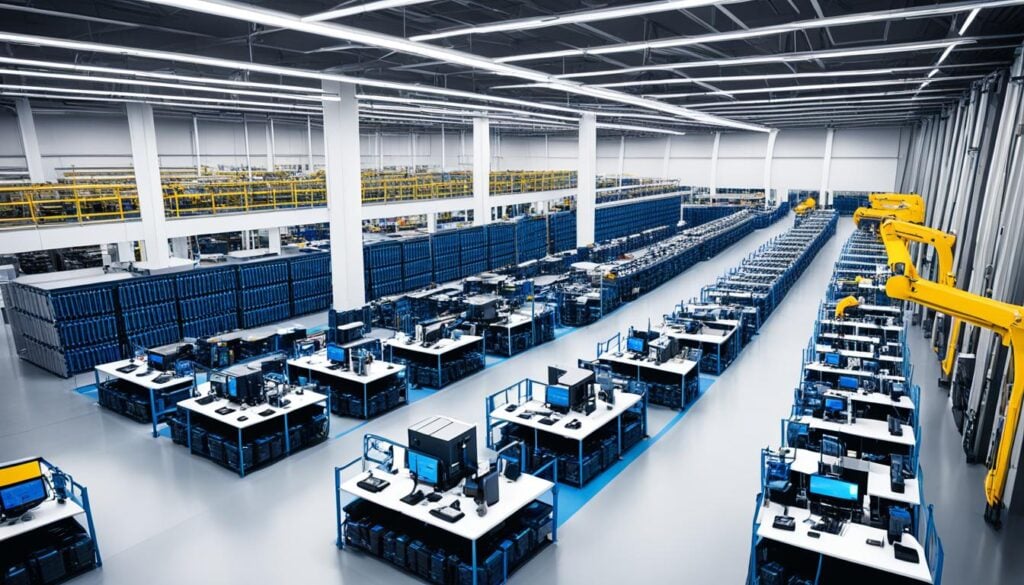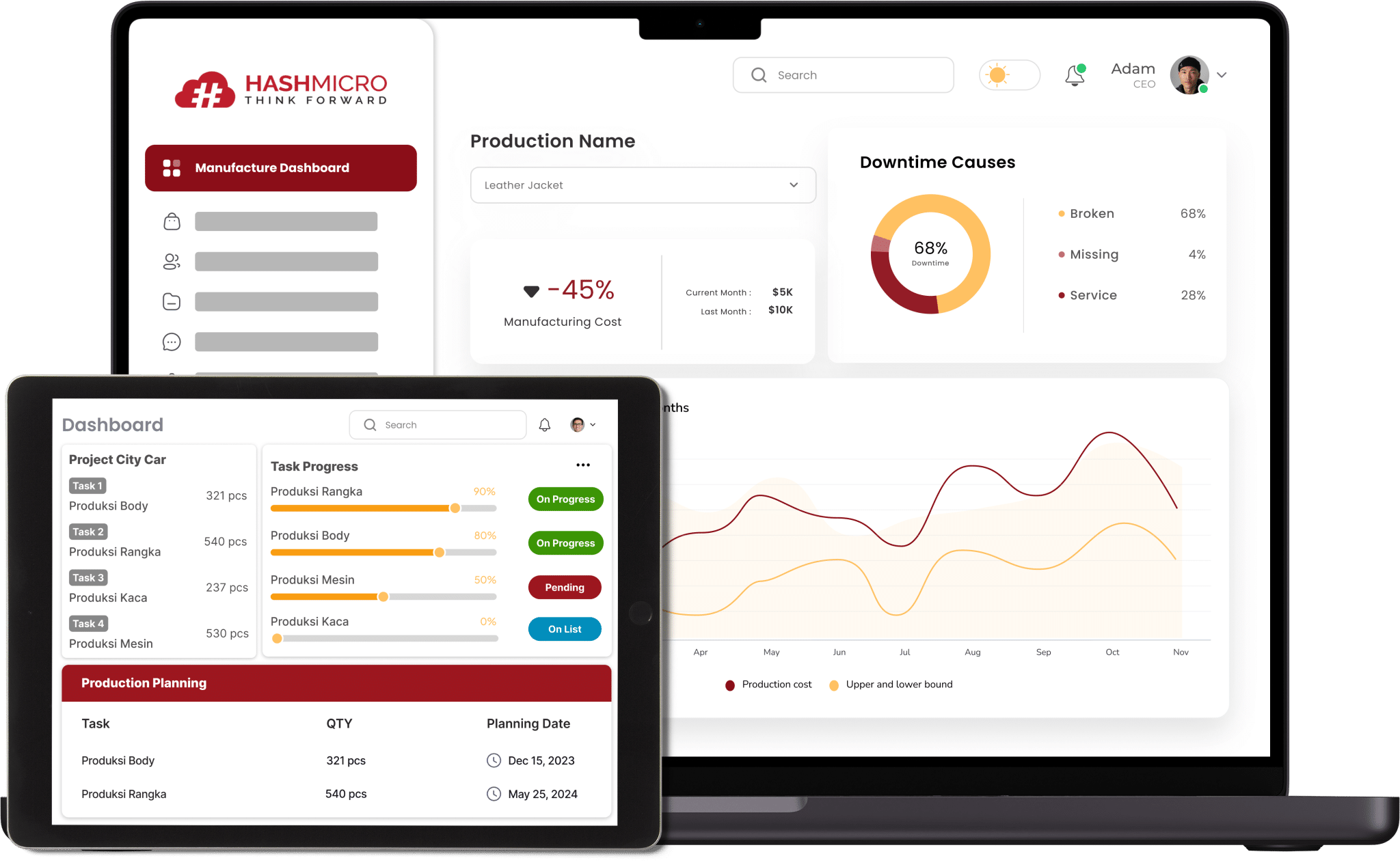Did you know the automotive industry in Singapore contributes around 5% to the national economy? Through close involvement with automotive businesses and automotive ERP software adoption, it’s clear the sector must innovate constantly. Competitive pressure continues to push companies toward smarter digital systems.
One such solution that has truly transformed operations is Enterprise Resource Planning (ERP) software. From my experience, automotive ERP software not only streamlines and automates business processes but also enables companies to operate smarter, boost efficiency, and improve profitability.
In this complete guide, you’ll explore how automotive ERP software supports manufacturers, distributors, and suppliers in Singapore. The article covers benefits, challenges, and key implementation factors for success. Book a free demo to see how an automotive ERP solution can optimize your operations.
Key Takeaways
|
Why the Automotive Industry Needs an ERP?
In the automotive industry, ERP (Enterprise Resource Planning) is essential for streamlining operations and improving efficiency. From my experience working with automotive companies, I have seen how ERP transforms business processes by integrating systems and providing real-time insights. This unified approach reduces delays, improves collaboration, and supports smarter decision-making.
ERP serves as a centralized solution that manages finance, human resources, supply chain, production, and more. For manufacturers, it helps oversee complex production cycles, optimize inventory, and strengthen supply chain management. At the same time, ERP supports better customer service by ensuring accurate records and faster response times.
With ERP software, automotive businesses gain tighter control of resources, lower costs, and higher productivity. In my view, implementing ERP is no longer optional, it is a strategic necessity that enables companies to stay competitive, adapt quickly to market demands, and achieve sustainable growth.

Challenges Faced by the Automobile Industry
The automobile industry faces numerous challenges that can impact efficiency, productivity, and competitiveness. From my experience working with automotive companies, I’ve observed that addressing these challenges effectively is essential to stay ahead in a highly competitive market. Implementing automotive ERP software can significantly help overcome these obstacles.
1. Quality Control
Ensuring consistent quality in automotive manufacturing is essential to meet customer expectations and regulatory requirements. The complex production processes and stringent quality standards make quality control a significant challenge. An automotive ERP software can help streamline quality control processes, track defects, and implement corrective actions, resulting in improved product quality.
2. Production Facilities Maintenance
Maintaining production facilities is vital to ensuring smooth operations and minimizing downtime. An automotive ERP software can help facilitate proactive maintenance planning, schedule equipment inspections, and track maintenance activities. By optimizing production facility maintenance, automotive businesses can enhance operational efficiency and reduce unplanned downtime.
3. Inventory Management and Forecasting
Managing inventory is a critical challenge in the automotive industry, where parts and components need to be readily available for production. An ERP system provides real-time visibility into inventory levels, enables accurate forecasting, and automates reorder points and replenishment processes. This streamlines inventory management, reduces stockouts, and improves overall supply chain efficiency.
4. Vendor Management
Automotive businesses often work with numerous vendors, making vendor management a complex task. Effective vendor management is essential to ensure the timely delivery of high-quality components at competitive prices. An ERP system can centralize vendor data, facilitate communication, track vendor performance, and automate purchase order processes, enabling efficient vendor management.
5. Financial Management
The automotive industry requires robust financial management to handle complex financial transactions, manage costs, and ensure regulatory compliance. An ERP system can provide comprehensive financial management capabilities, including budgeting, cost tracking, accounts payable and receivable, financial reporting, and compliance management. This empowers automotive businesses to make informed financial decisions and maintain financial stability.
6. Centralized Document and Data Management
In the automotive industry, managing a vast amount of documents and data is a challenge. From contracts and product specifications to maintenance records and compliance documents, organizations need efficient document and data management processes. An ERP system offers centralized document management, ensuring easy access, version control, and streamlined collaboration across departments.
7. Human Resource Management
Managing human resources in the automotive industry involves various complexities, including workforce planning, talent acquisition, training, and performance management. An ERP system can automate HR processes, such as recruitment, employee onboarding, training management, and performance evaluations. This simplifies HR tasks, enhances employee satisfaction, and improves overall workforce efficiency.

In summary, the automotive industry faces many operational and strategic challenges. Based on my experience, implementing an ERP system can address these issues by enhancing quality control, maintenance, inventory, vendor relations, financial management, document handling, and HR operations, ultimately improving efficiency and competitiveness.
Key Functions & Benefits for Automotive ERP Software
Implementing an ERP system is crucial for the automotive industry in Singapore. The benefits of automotive ERP software are far-reaching, providing a competitive edge and driving growth for businesses in the automotive sector. Let’s delve into the key reasons why the automotive industry needs an ERP:
- Reduced Cost and Higher ROI: An automotive ERP software streamlines processes and eliminates manual tasks, resulting in cost reduction. With automation and optimized resource allocation, the automotive industry can achieve a higher return on investment (ROI).
- Smooth Collaboration: Effective collaboration is essential for success, and an automotive ERP software facilitates seamless communication and coordination across departments. This enables teams to work together efficiently, leading to improved overall performance and customer satisfaction.
- Accurate Reporting and Analytics: ERP systems offer real-time data and robust analytics tools. I find these capabilities invaluable, as they help automotive businesses make informed decisions, identify bottlenecks, and plan strategically for long-term growth.
- Excellent Customer Service: With an automotive ERP software, automotive businesses can enhance customer service by delivering faster response times and personalized experiences. CRM integration within the ERP enables businesses to maintain an up-to-date customer database, track interactions, and provide superior service at every touchpoint.

- Improve Productivity: ERP automates routine tasks, eliminates duplicative efforts, and provides a centralized platform for efficient workflow management. By optimizing processes, the automotive industry can significantly improve productivity, enabling teams to focus on value-added activities and strategic initiatives.
- Smart Production Process: ERP supports intelligent production planning, resource allocation, and scheduling. In my assessment, having real-time visibility into operations helps automotive businesses optimize production cycles, reduce lead times, and manage inventory more efficiently.
- Inventory and Warehouse Management: Effective inventory and warehouse management are crucial for the automotive industry. Automotive ERP software enable accurate forecasting, real-time inventory tracking, and improved demand management. With better control over stock levels, businesses can minimize stockouts, reduce carrying costs, and enhance customer satisfaction.
- Enhance Data Security and Compliance: Data security and regulatory compliance are non-negotiable. I value ERP’s robust security measures, which safeguard sensitive customer and operational data while ensuring adherence to industry standards and regulations.
- Vendor Management: Efficient vendor management is essential for the automotive industry. Automotive ERP software enable automated procurement processes, streamlined supplier communication, and improved contract management. This leads to better negotiation, reduced lead times, and enhanced vendor relationships.
- Electronic Document Management: An ERP system enables electronic document management, eliminating paperwork, reducing manual errors, and enhancing document control and accessibility. Documents such as invoices, purchase orders, and contracts can be easily stored, retrieved, and shared, resulting in improved operational efficiency.

How to Choose The Right ERP for the Automotive Industry
From my experience advising automotive businesses, selecting the right automotive ERP software requires careful evaluation of multiple factors. Below are the key considerations that will guide you to make an informed choice:
- Company-specific needs: Begin by analyzing your company’s specific objectives and pain points. Whether it’s managing complex supply chains, optimizing production, or improving reporting, defining these needs ensures the ERP solution aligns with your strategic goals
- Features and services provided: Evaluate the features provided by ERP vendors. For the automotive industry, critical tools include manufacturing requisition planning, IoT integration for equipment sensors, finished goods simulation, and Gantt chart scheduling. From my experience, I always recommend choosing a system that enhances your current workflows rather than overcomplicating them, while also leaving room for scalability.
- ERP security: Data protection is non-negotiable. A reliable ERP should provide encryption, role-based access, and frequent updates to defend against threats. Strong security not only safeguards sensitive information but also ensures compliance with industry regulations.
- Budget requirements: Consider both upfront and ongoing costs, such as licensing, hardware, and maintenance. When I guide clients through ERP budgeting, I emphasize the importance of balancing affordability with functionality. The right investment often delivers long-term savings and higher ROI, rather than just focusing on the lowest cost.
- ERP provider’s reputation: Research the reputation of the ERP providers in the automotive industry. Look for reviews, testimonials, and case studies to gain insights into the experiences of other businesses. Choose the best ERP software provider with a proven track record, strong customer support, and a reputation for delivering reliable and efficient solutions.
By weighing these factors (needs, features, security, budget, and vendor reputation) automotive businesses can select the right ERP to enhance efficiency, strengthen competitiveness, and drive sustainable growth.
How Can HashMicro Help the Automotive Industry with The Best ERP Solution

In today’s rapidly evolving automotive industry, businesses need robust automotive ERP softwares to streamline their operations and stay ahead of the competition. From my experience, having an ERP system that addresses industry-specific challenges is crucial.
HashMicro, a leading provider of automotive ERP software, offers a comprehensive suite of tools specifically designed to tackle the unique needs of the automotive industry. I’ve observed how its solutions help companies improve efficiency, centralize data, and make more informed decisions.
HashMicro offers complete and comprehensive features that benefit automotive production below:
| Key Features | Benefits |
| Manufacturing Requisition Planning | Optimized resource allocation, reduced lead times, enhanced production efficiency |
| Conveyor Belt Sensor IoT Integration | Real-time monitoring, improved process flow, optimized production performance |
| Finished Goods Production Simulation | Accurate production scenario simulation, optimized production schedules, increased productivity |
| Manufacturing Gantt Chart Schedule Management | Visual representation of production schedules, effective planning and tracking, timely delivery of products |
| Integration with Accounting, CRM, HRM, and Others | Efficient data management, seamless information sharing, improved operational efficiency |
It also has some benefits like unlimited users, bank integration, and free consultation with ERP professionals. Excellent services offered by HashMicro will take your automotive business to a higher level of efficiency.
With HashMicro’s best-in-class ERP solution, automotive businesses can optimize their operations, improve productivity, and stay competitive in the dynamic automotive industry. By adopting the innovative features and functionalities offered by HashMicro, businesses can achieve higher levels of efficiency, cost-effectiveness, and customer satisfaction.
Conclusion
In conclusion, ERP solutions have proven to be a game-changer for the automotive industry in Singapore. The implementation of automotive ERP software offers numerous benefits, including improved efficiency and a competitive advantage.
By automating and streamlining various business processes, automotive ERP software enables automotive businesses to optimize operations and deliver enhanced services to their customers.
In my professional opinion, adopting a solution like HashMicro positions automotive companies for long-term success, helping them stay ahead of competitors and meet the evolving demands of the Singapore market. Don’t wait, take the first step toward operational excellence and sustainable growth by trying the HashMicro ERP system.
Grab your chance to try the free demo now!


































